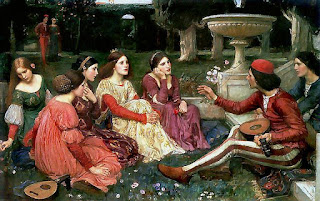One theory of the Black Death was that it resulted from bad air rising from swamps and cesspools, and going up into the fresh air outside the city was one way to escape it. Of course, whether the disease were being transmitted by fleas jumping from mammal to mammal or being spread by contact with those who were ill, getting away from crowded populations into fresh air would be an obvious smart choice.
The ten young people decide to pass the time by each telling a tale each day, resulting over the ten days in a collection of 100 tales. Each of the ten takes a turn being the king or the queen for a day, and gets to choose the day's theme. The themes include comedy, tragedy, romance, etc., but go beyond those simple topics.
One day is for stories of virtue, one is romances that end happily, while one is for romances that end in tragedy. There are tales of luck, tales about women who play tricks on men, and tales where the main character is in trouble but saves himself or herself by quick thinking at the climax.
The whole is not just a sequence of tales. Boccaccio gives us a description of other ways that the ten occupy their time, including songs that they sing to entertain each other. These songs, the daily activities, and the tales themselves with some of their recurring concepts of mocking the clergy, nouveau riche vs. old noble families, and the similarity between men and women's lust and ambition, paint a picture of 14th century Italian life in prose that is a useful introduction to the feelings of the time and place.
Boccaccio likely made up none of the tales, but that does not mean there is no original material. The medieval approach was to take a known tale and develop it in new ways. Most of the tales in the Decameron can be found in other forms in earlier sources...and later, since his tales were read and used by others, such as Geoffrey Chaucer in the Canterbury Tales.
Despite the name Decameron, Boccaccio also referred to the work by two other names, which are interesting anecdotes in their own way. I'll share those tomorrow.

No comments:
Post a Comment
Note: Only a member of this blog may post a comment.